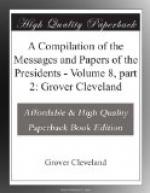By these approximations to an equality of duties and of charges not only has the commerce between the two countries prospered, but friendly dispositions have been on both sides encouraged and promoted. They will continue to be cherished and cultivated on the part of the United States. It would have been gratifying to have had it in my power to add that the claims upon the justice of the French Government, involving the property and the comfortable subsistence of many of our fellow-citizens, and which have been so long and so earnestly urged, were in a more promising train of adjustment than at your last meeting; but their condition remains unaltered.
With the Government of the Netherlands the mutual abandonment of discriminating duties had been regulated by legislative acts on both sides. The act of Congress of the 20th of April, 1818, abolished all discriminating duties of impost and tonnage upon the vessels and produce of the Netherlands in the ports of the United States upon the assurance given by the Government of the Netherlands that all such duties operating against the shipping and commerce of the United States in that Kingdom had been abolished. These reciprocal regulations had continued in force several years when the discriminating principle was resumed by the Netherlands in a new and indirect form by a bounty of 10 per cent in the shape of a return of duties to their national vessels, and in which those of the United States are not permitted to participate. By the act of Congress of 7th January, 1824, all discriminating duties in the United States were again suspended, so far as related to the vessels and produce of the Netherlands, so long as the reciprocal exemption should be extended to the vessels and produce of the United States in the Netherlands. But the same act provides that in the event of a restoration of discriminating duties to operate against the shipping and commerce of the United States in any of the foreign countries referred to therein the suspension of discriminating duties in favor of the navigation of such foreign country should cease and all the provisions of the acts imposing discriminating foreign tonnage and impost duties in the United States should revive and be in full force with regard to that nation.




